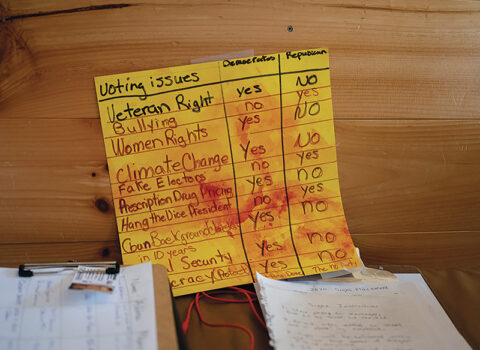A Just Decision in Kansas
The state Supreme Court tells Kansas legislators to restore funding for education. Will they comply?
Kansas can be a bit of a blowhard. The state’s most infamous characters have long spoken with a didactic assuredness that defies the trope of Midwestern humility, and to that spirit is owed her original, enduring gift to the union — declaration as a free state at a pivotal juncture before the Civil War — as well as her most dangerous errors in the name of morality. In recent weeks, the Kansas legislature has offered plenty of the latter, introducing headline-grabbing bills to eliminate “no fault” as grounds for divorce, to ban surrogate pregnancies, to allow parents and teachers to bruise children with their open hands, and to let businesses deny service to homosexuals. Last month, Governor Sam Brownback headlined a rally for a political operative whose website declares, “This is a Christian nation, and the Lord wants His Bride to rise up.” But today, through its quietest branch of government, Kansas took a well-reasoned stance that will echo across the country: This is a democratic state, and its constitution wants the legislature to fund education.
This morning the state Supreme Court ruled, in Gannon v. Kansas, that lawmakers have failed in their constitutional obligation to fund schools, thereby upholding a district-court opinion that budget cuts in recent years have created unreasonable, wealth-based disparities and inequitable educational opportunities among schools. The ruling sets a July 1 deadline for the restoration of $129 million in funding to poorer school districts. With respect to the broader state education budget, the court was less prescriptive, returning the matter to the district courts without a deadline for action, though encouraging them to step lively. The lower court could call for more than $440 million in funding increases.
Whether the legislature will obey either edict is another matter. Compliance could require Kansas to repeal bone-deep cuts in income-tax revenue — $2.5 billion through 2018 — that were passed two sessions ago, or to take less sane measures like moving existing funds from other budget areas, or noodling with the formulas that decide appropriations per school. Last session, members of the Senate proposed an amendment to the state constitution that would nullify judicial authority in school-finance matters, and another that would allow the governor to name Supreme Court justices without input from an elected commission. Brownback has also urged Congress to alter the constitutional clause requiring the “suitable financing” of education, which keeps getting the state in trouble.
If the legislature continues to refuse this constitutional mandate, it will do so in the face of two court decisions based on a cumulative 28,327 pages of exhibits, 5,072 pages of trial transcripts, the testimony of sixty-three witnesses, and nearly fifteen years of litigation. More poignantly, it will do so on the sixtieth anniversary of another gift to public education from Kansas (among others): Brown v. Board of Education. In its focus on hard cash, Gannon adds a statement about socioeconomic class to Brown’s on race, challenging a state legislature and board of education that have been backed by proponents of siphoning public funds toward private-school voucher programs.
Jeff Gannon, the eponymous plaintiff and a Methodist pastor in Wichita, told me over the phone that the people running Kansas don’t hold equitable education as a value. The state constitution, however, does. “Until that clash is resolved or compromise is somehow achieved, we will never be able to get past this,” he said. “This is their opportunity to show that, in spite of the people who put them in office, [they] serve the whole of Kansas. Not just the persons who support them financially.”
Gannon and his wife are both products of public education, and they enroll their two children in Wichita’s diverse public district rather than in private schools. “That’s why we offered our children’s names. They were involved in that decision and totally concur with the idea that this is about the common good, and for them to be good citizens they have to have that vision,” he said. His desire to counter stereotypes about the state’s faith-based communities also drove his involvement. “The religious community are allowing a particular ideology to speak for the whole,” he said. “How dare you say that people of faith believe a particular way about this? I want to be a person of faith, I want to be a religious leader, who says that we have a moral obligation to serve every child in Kansas.”
Today’s court ruling is a theoretical victory for those children, but it’s on Kansas lawmakers to follow through with what Brownback has called “the messy business of appropriations.” The governor’s immediate response to the ruling promised cooperation among the branches and included the statement, “We will fix this.” Recent history suggests otherwise, but who knows? “God, by the Spirit, isn’t predictable,” the religious scholar Matt Sigler has said. “But as we come with child-like faith, the Triune God always meets us in our mess.”
Sarah Smarsh has reported on Kansas’s culture, politics, and environment for more than a decade. She is the creator of Free State Media, a public audio-storytelling platform that will focus on Kansas education in Autumn 2014. Read her post on the build-up to the Gannon decision, “Cutting School in Kansas.”

















































































































